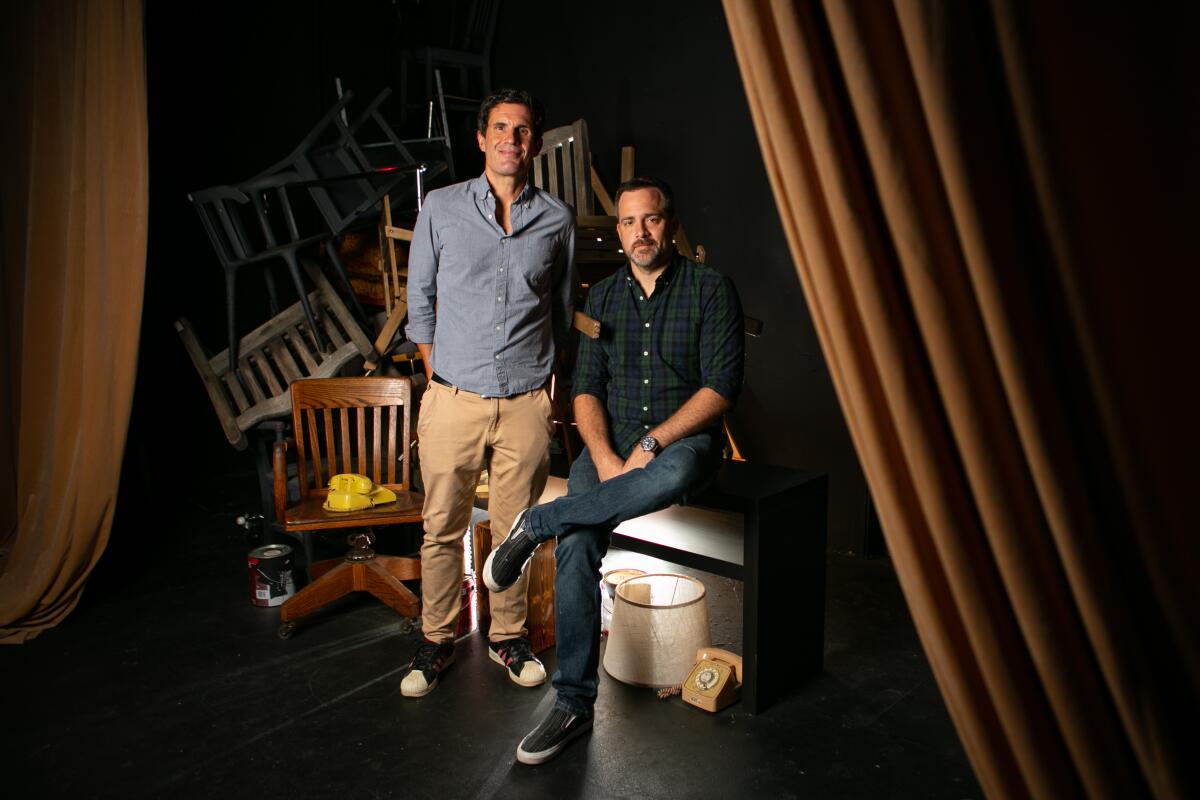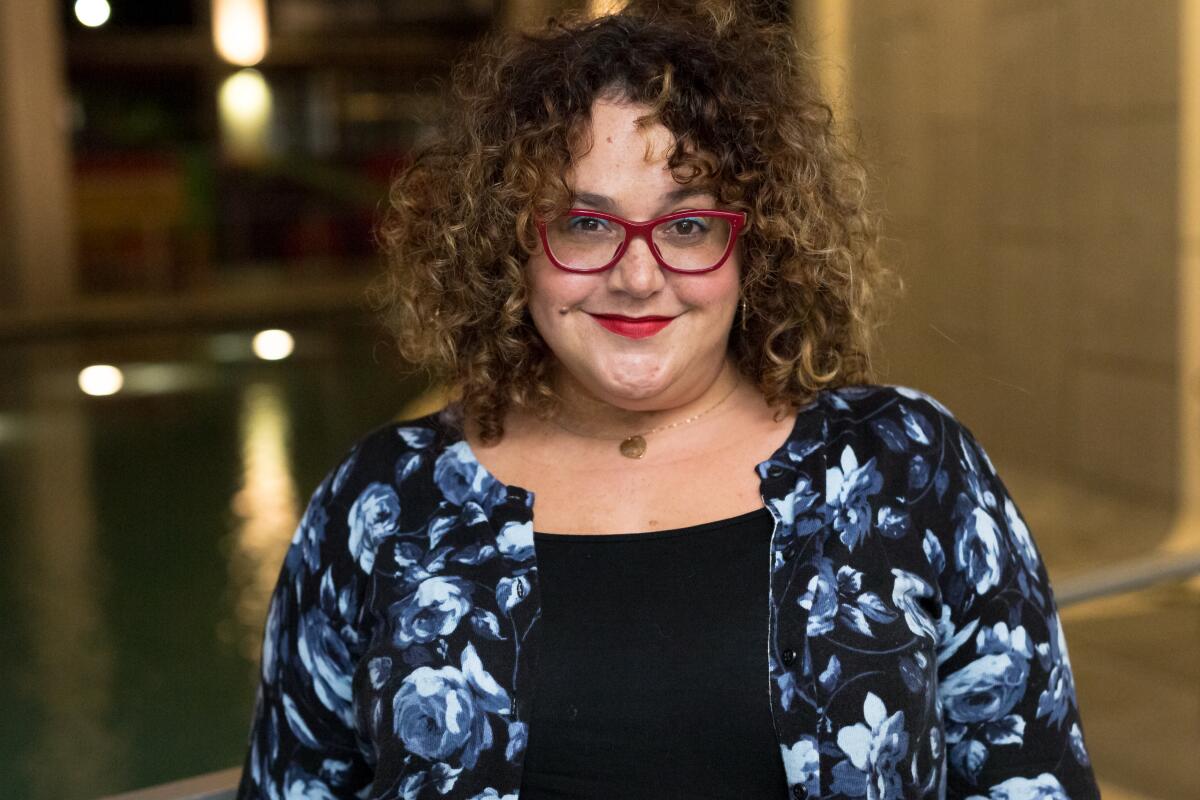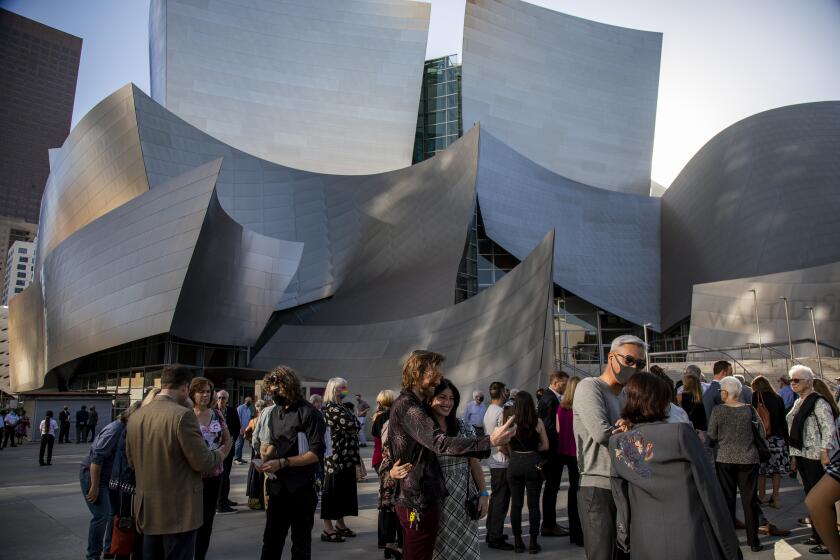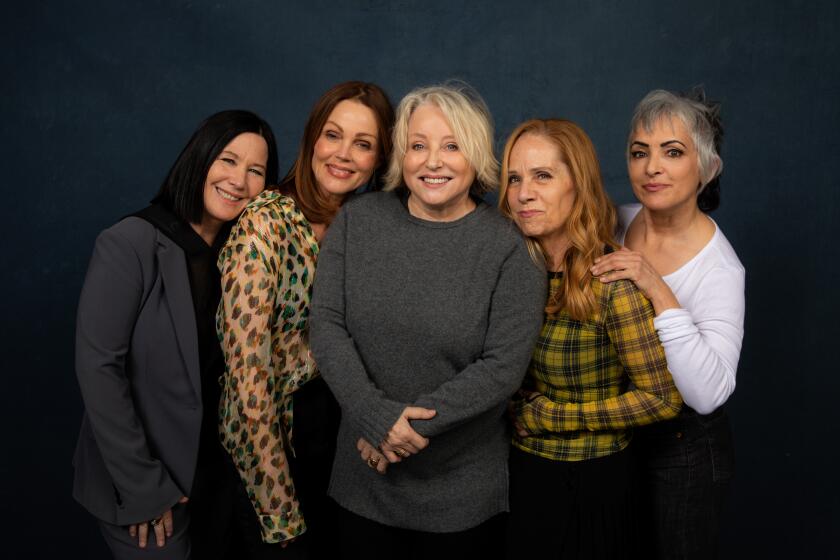‘We are counting on miracles’: L.A.’s small theaters worry about hanging on

- Share via
On the night before Independent Shakespeare Co. was to stage its press preview for “The Tempest,” vandals snuck onto the Griffith Park set and destroyed it. They smashed the lights and cut all the cables, causing about $15,000 in damage.
Artistic Director David Melville got a call from the city the following morning and rushed to the site of the Griffith Park Free Shakespeare Festival. With the aid of volunteers, the set was resurrected and the show went on that evening — the first live performance the company pulled off in 18 months.
For the record:
11:51 a.m. Aug. 24, 2021An earlier version of this article identified Tim Wright as artistic director of Circle X Theatre Co. He is its executive director.
To riff on a viral meme about this perilous new phase of the pandemic: If the August opening of “The Tempest” represented the hopes, dreams and grand plans of L.A.’s small theater companies in the spring and early summer, when vaccinations soared and COVID-19 infections plummeted, then the park vandals represented the Delta variant.
Taking that analogy further: Melville’s stamina in the face of disaster, and the dozens of patrons who pitched in the money to cover losses from the incident, illustrate the tenacious mindset of vulnerable nonprofit theaters as Delta rampages across the country.
Los Angeles Philharmonic is the latest to require proof of full vaccination, with no exception based on personal or religious beliefs.
And so the question looms: How much longer can these companies stay afloat financially? With pandemic funding drying up, 99-seat theaters are scrambling to stay on track with reopenings that were planned during better days.
Rising infections in L.A. forced Independent Shakespeare Co. to work in tandem with the city to cap the park audience at 250.
In normal times the company would stage two festival shows over 10 or 11 weeks, often attracting more than 1,000 people a night and earning about $150,000 in donations. In the summer of Delta, ISC is staging one show for five weeks, and Melville estimates the effort will generate about $40,000 to $45,000 in donations.
Melville says if the company can stage a few more productions through the end of the year, including its annual “Christmas Carol,” it should be OK. If not, the going could get rough.
“The PPP loans from last year and this year were crucial, and without those we would not have been able to keep going — so that’s a little worrying because those aren’t going to be there next year,” Melville says.
Similar worries plague Tim Wright, executive director of Circle X Theatre Co., which operates four theaters at the Atwater Village Theatre complex. Wright says the company has not paid rent on the space in 18 months. He stresses that his landlord wants to keep the complex for theater and has been incredibly understanding about the missed rent. Circle X has stayed afloat thanks to a panoply of relief grants, including money from the L.A. County Arts Commission through the CARES Act, a Shuttered Venue Operators grant and a California Relief Fund grant.
As far as Wright knows, only one additional relief grant is coming — courtesy of the National Endowment for the Arts. In normal times Circle X makes about a third of its income from grants, a third from ticket sales and a third from individual contributions. Wright’s goal is to raise enough money to make his landlord whole again, but what if Delta makes live performance impossible?
“If we get to December [without shows] I think we’ll end up giving the space back,” Wright says. “At a certain point it feels irresponsible to not be considerate of others who are taking a huge loss on this.”
For the moment Wright is testing the waters alongside Johnny Clark, artistic director of VS. Theatre Company, with a coproduction of a one-man show titled “Stand Up If You’re Here Tonight.” The show is running indoors with masks and proof of vaccination required.
“The theater seats over 60, I think we’re at about 40 in terms of capacity. It’s a 60-minute show with no concessions and no intermission,” says Clark, adding he thought the show would be part of a joyous wave of reopenings, rather than a canary in a coal mine. “It’s a horrible time to produce theater, but for those people who feel comfortable showing up, I think it will open their hearts a bit.”
Other groups with larger casts have taken a different approach. Ron Sossi, artistic director of Odyssey Theatre Ensemble, recently pushed back the Sept. 18 reopening of “The Serpent” because several cast members felt uncomfortable rehearsing during the Delta surge. The show originally opened a week before the March 2020 shutdown, and the company had long planned for the resurrection of “The Serpent” to be the center of a triumphant return.
Sossi says he now hopes to begin rehearsals in late September and open the show in mid-October.
“If the Delta variant continues to be strong or growing, it doesn’t make much sense for us to open a lot later than mid-October because of the holidays, so there is a chance we would indefinitely postpone ‘The Serpent,’” Sossi says. “I don’t want to go forward unless it feels really safe — so we’re in that holding pattern.”
Many 99-seat theater companies don’t count on ticket sales for funding, but Sossi says the Odyssey is a an exception.
“We rely on ticket sales more than most people,” Sossi says, adding that most of the additional funding the company gets is dependent on active productions. “We’ve got some money in our coffers and we’re waiting to produce. We could hold out until the middle of the year, but we have to do some stuff to justify the grants.”
Jon Lawrence Rivera, artistic director of Playwrights Arena, an important supporter of original work by L.A. writers, says that two months ago he was planning on an October reopening, but now that looks increasingly unlikely. It isn’t safe to cram 99 people into a theater, and he estimates that he can draw about half of that if he reopens.
“If we are operating at 50% capacity, I am prepared to say that for the next two or three shows we will lose $25,000 per show,” Rivera says. “I don’t know how we will survive that. We are counting on miracles.”
Like most small-theater leaders, Rivera has been campaigning for SB 805, a state bill that if passed would provide funding for nonprofit performing arts organizations that make less than $1.4 million per year.
A recent state law requiring small theaters to pay actors minimum wage, along with an Actors’ Equity Assn. mandate to have a COVID-19 officer be present at all shows, have more than doubled the cost of a typical production from about $20,000 to nearly $50,000, Rivera says. Add Delta to the mix and expenses begin to feel unmanageable.
“I don’t know how we’re going to keep doing what we’re doing with these variants and the instability of audience members,” Rivera says. “I think we could only sustain it for six months, maybe a year.”
With pandemic funding vanishing, many companies must fall back on traditional forms of fundraising, and it’s common for city and state grants to require a certain amount of activity to unlock money. That’s posing a lot of uncertainty for Theatre West, which receives the bulk of its grants for an annual program for young audiences called Storybook Theatre.
Are recently reopened schools going to send busloads of students to the theater, as they did in pre-pandemic times, wonders Michael Van Duzer, chair of Theatre West’s artistic board. And if they do, how will the company — which has relied on interactivity to make the program fun — keep unvaccinated kids under 12 safe and entertained?
“Everything is a question mark,” Van Duzer says.
One thing is almost certain: On Sept. 24 the company will open its world-premiere production of “Our Man in Santiago,” originally scheduled to bow on March 13, 2020.
“We’ve made a vow to reopen with this production, and barring an absolute shutdown, we’re going to run those five weeks,” Van Duzer says.
Elisa Bocanegra, founder of the BIPOC company Hero Theatre, also is prepared to forge ahead with a long-planned reading Saturday, even if only 10 people show up, she says. The show, “Flex” by Candrice Jones, is about a Black women’s basketball team in the South.
“It’s so much a celebration of Southern Black women and joy,” says Bocanegra, adding that she originally wanted to fully stage the play.
“We just needed something to show us that we were still alive,” Bocanegra says. “Maybe it’s crazy to do this reading now, but we needed to be together.”

Hero is celebrating its 10th anniversary under a Delta cloud made darker by the fact that Bocanegra’s brother is a COVID-19 long-hauler and has been hospitalized since last summer after a stroke caused by the disease.
“This is affecting so many communities of color at a disproportionate rate,” Bocanegra says. “Trying to keep a theater company afloat amidst what so many families are going through is so hard.”
Through sheer force of will Bocanegra and her leadership team have weathered the last 18 months. Many company members were on unemployment, and Bocanegra booked a Chevy commercial in Spanish. She says she has put every last penny into the company and devoted her waking hours to fundraising, including a recent campaign with a $100,000 goal.
“If we have to go through another two years of just fundraising and applying for emergency grants, we’re just not going to make it through — I’m not going to make it through,” Bocanegra says.
Then, like most small theater leaders, she quickly corrects course.
“We’re not going anywhere,” Bocanegra says, adding that she comes from a strong-willed Puerto Rican family. “We’re going to keep doing this. There’s no way we’re going to let COVID take us down.”
The Pasadena Playhouse’s 2021-22 season includes the Los Angeles premiere of “Freestyle Love Supreme,” plus works by Holland Taylor and Mike Lew.
More to Read
The biggest entertainment stories
Get our big stories about Hollywood, film, television, music, arts, culture and more right in your inbox as soon as they publish.
You may occasionally receive promotional content from the Los Angeles Times.












